History of HEKS/EPER
HEKS/EPER has been championing the cause of needy and disadvantaged people since 1946. Over the decades, church aid and reconstruction work in a war-ravaged and poverty-stricken post-war Europe evolved into a worldwide engagement for a more just world and a life in dignity for all people. HEKS/EPER itself grew into a professional aid agency that supports over a million people through its projects and its development policy work.
1945-1956
HEKS/EPER – the early years
Those early years saw extraordinary accomplishments. In the first two years alone, some 4000 tonnes of clothing, shoes, blankets, soap, canned products, potatoes and other in-kind donations from Swiss communities were dispatched to neighbouring countries. HEKS/EPER organised emergency food supplies for children and the elderly, set up orphanages and children's homes and arranged recreational stays in Switzerland for children traumatised by war. In 1947 HEKS/EPER established «Casa Locarno» in the Ticino, a house of rest and recovery as well as encounter for people from a wide variety of countries and religions. Roughly 5000 people from 36 countries visited the house over the first 20 years. Despite the looming cold war, HEKS/ EPER also pressed ahead with its cooperation with church parishes in Eastern Europe, supporting them in their ecclesiastic and diaconal work and launching the first church parish partnerships. In 1949 HEKS/EPER took over «Protestant Refugee Aid» [Evangelische Flüchtlingshilfe], which faced its first real test in 1956 when over 200,000 Hungarians fled their country. At the time it arranged to receive and care for 2000 Protestant Hungarian refugees.
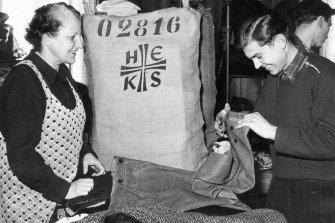
1957–1967
Expansion to the Global South and the emergence of «Bread for Brethren»
As of the end of the Second World War, a growing number of colonies in Africa and Asia were gaining political independence. In parallel to that trend, HEKS/EPER also extended its activities to include those still fledgling nations. The first «development project» was launched in 1957 in Southern India in the form of a training workshop for toolmakers, with funds raised by the cantonal churches. HEKS/EPER later participated in setting up Protestant secondary schools in the Democratic Republic of the Congo and began the first programmes in Haiti and Argentina.
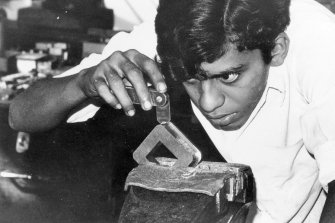
In the early 1960s and given the challenges then confronting the former colonies, the two relief agencies HEKS/EPER and Basel Mission BM developed the idea of a national collection campaign. Accordingly, they made common cause with the churches in 1961 to launch the initiative called «Bread for Brethren» (later to become «Bread for All»). Within two years, 15.7 million francs were raised for development aid projects run by HEKS/EPER and the Protestant missions. Only a one-off collection campaign had been envisaged. It soon became apparent, however, that church funds would be needed every year if «Solidarity with the disadvantaged» was to prove more than just empty rhetoric. Bread for Brethren therefore launched a second campaign from 1965 to 1967.
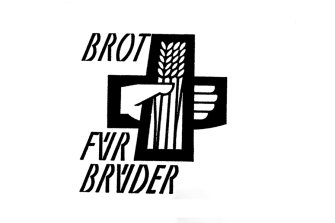
1967–1979
From «development aid» to development policy
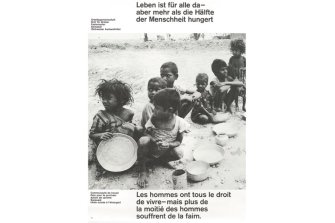
HEKS/EPER too became more politically engaged and intensified its development policy-related communication in Switzerland. In so doing it came down firmly on the side of population groups being oppressed by the apartheid regime in Angola, Zimbabwe and South Africa and supported them in their aspiration for equal rights. HEKS/EPER took part in the World Council of Churches’ Programme to Combat Racism and attracted sharp criticism as a result. In the aftermath of the Vietnam war, HEKS/EPER also launched into reconstruction work, following years of humanitarian assistance. In addition, HEKS/EPER lobbied in Switzerland for the admission of more refugees from Indochina and assisted them in becoming integrated into Swiss society. Those years brought expanded relations with relief agencies, human rights groups and grassroots movements as a way of furthering the work of development. Following catastrophic flooding in North Africa and Eastern Europe, earthquakes in Turkey and Peru as well as a storm surge in Pakistan, HEKS/EPER also set up its own disaster relief service.
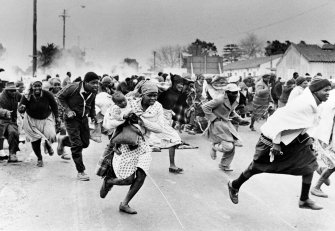
1980–1991
Greater commitment to refugee causes and development policy
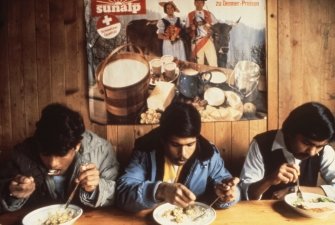
Bread for Brethren meanwhile became more engaged with development policy issues. As part the Swiss Coalition of Development Organisations (Alliance Sud today), it got behind several political initiatives relating to topics such as fair trade or development funding. The 1983 petition «Entwicklung ist eine Überlebensfrage» [Development is a matter of survival] brought the first flush of success. It urged the Swiss government to increase funding for development cooperation, ultimately prompting the Federal Cabinet to increase the 1985–1987 development aid budget to 0.31 per cent of gross national income (GNI). Buoyed by this remarkable success, Bread for Brethren teamed up with Swiss Catholic Lenten Fund and 20 other organizations in 1989 to launch the petition «Entwicklung braucht Entschuldung» [Development needs debt relief]. The call was for Switzerland, in marking its 700th anniversary, to establish a 700 million franc-fund to provide debt relief for the poorest developing countries. Submitted in June 1990 with 250,000 signatures, this petition too proved successful. The Parliament adopted a postulate in that same year and approved two new framework credits in 1991. One was in the amount of 400 million francs for the funding of debt relief programmes, and the other, 300 million, dedicated to global environmental measures. In June 1998 it was decided that «Bread for Brethren» would be renamed «Bread for All».
1991–1999
Fair trade, corporate responsibility and reorientation of work in Europe
Years of effort by Bread for All to promote fairer trade finally paid off. After numerous rounds of negotiation, the Migros and Coop supermarket chains agreed to include fair trade products in their assortment. In 1992 and in collaboration with HEKS/EPER, Swiss Catholic Lenten Fund and other relief agencies, Bread for All established the «Max Havelaar Switzerland» foundation. In 1995 Bread for All was instrumental in introducing a fair trade label for the carpet-making industry through the «Stiftung für gerechte Bedingungen in Teppich-Herstellung und Handel» [Foundation for fair conditions in carpet production and trade] (STEP). This latter entity was incorporated into the Max Havelaar foundation in 2007. The year 1995 also witnessed initial talks between the leaders of Bread for All and those of HEKS/EPER and the Federation of Swiss Protestant Churches (FSPC) about a possible merger of the two agencies. But the idea was scrapped owing to differences in the priorities of both organisations. Jointly with Swiss Catholic Lenten Fund and the Bern Declaration (now «Public Eye»), Bread for All launched the Clean Clothes Campaign (CCC) in 1999, calling for decent working conditions and a ban on child labour in the garment industry.
In the aftermath of the Cold War, HEKS/EPER completely overhauled its project work in Eastern Europe. The principal activities during those years were reconstruction in former East Bloc countries and humanitarian aid during the Yugoslav Wars. In Romania, for example, in addition to interchurch aid, a regional rural development programme began to take shape. HEKS/EPER took part in emergency relief and reconstruction projects in Macedonia, Albania and Kosovo. Tens of thousands of refugees came to Switzerland – many of whom would be supported by HEKS/EPER in the ensuing years through projects to accompany and advise them in Switzerland and to prepare for their return. In 1991 the Federation of Swiss Protestant Churches extended the HEKS/EPER mandate in Switzerland, tasking it with «Advocacy for the socially disadvantaged». In 1993 HEKS/EPER then collaborated with the «Birseck» housing project for people suffering from addiction, to establish its first project for socially underprivileged Swiss citizens and mounted programmes to integrate jobless people. HEKS/EPER again provided humanitarian aid in the wake of the genocide in Rwanda. HEKS/EPER also coordinated international election monitoring in South Africa and Mozambique by churches. In Latin America, HEKS/EPER supported agrarian reform and advocated on behalf of the landless.
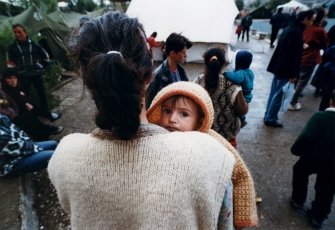
2000–2010
Emergency relief, reorientation of work in Switzerland and strategic repositioning
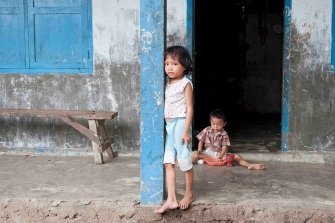
Bread for All too reviewed its strategy, so that there were more people working on a smaller range of issues. Climate change was also being tackled as a new subject area alongside development policy, and activities relating to «food and agriculture» and «corporate responsibility» were expanded. Bread for All broadened its networks and intensified cooperation with international partner organizations both in Switzerland and beyond the nation's borders. A possible merger with HEKS/EPER again came within reach. The leaders of both organisations held talks in 2002 and 2004 about a merger. But both initiatives were again discarded. Instead, cooperation was deepened through new modalities.
2010 to date
Refugee flows, corporate responsibility and merger
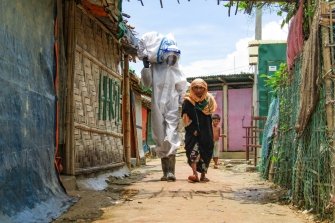
Corporate responsibility became a central field of activity for Bread for All. As the Federal Council and Parliament could not agree on any legal regulations, Bread for All – as a part of the «Corporate Justice» [Recht ohne Grenzen] coalition – launched a Responsible Business Initiative in 2015. Although it garnered 50.7 per cent of the popular vote, the initiative failed for lack of majority support from the cantons. Climate became the hallmark of the year 2019. Led by the activist Greta Thunberg, young people took to the streets, and Bread for All also got behind the «Glacier Initiative» and started «climate talks». In 2019 the Boards of Trustees of HEKS/EPER and Bread for All decided on the merger of the two agencies, and this materialised in November 2021.
